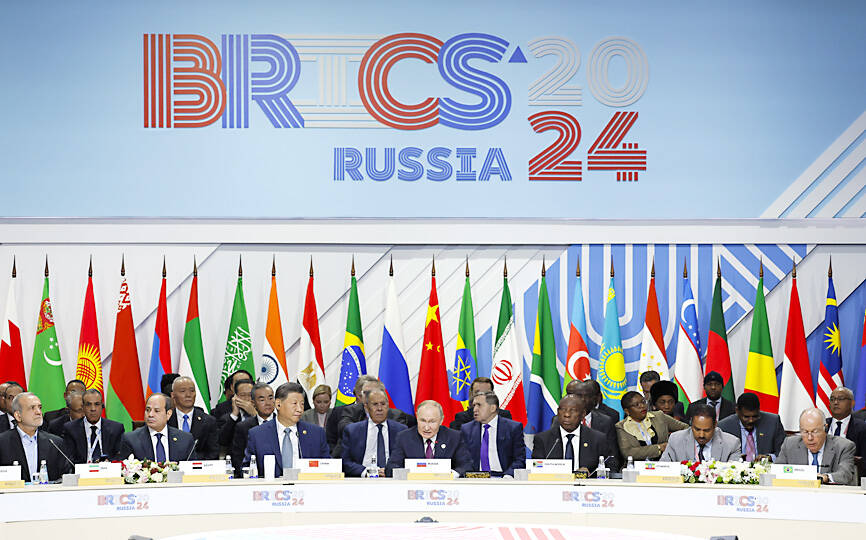US president-elect Donald Trump on Saturday threatened 100 percent tariffs against a bloc of nine nations if they act to undermine the US dollar.
His threat was directed at countries in the so-called BRICS alliance, which consists of Brazil, Russia, India, China, South Africa, Egypt, Ethiopia, Iran and the United Arab Emirates.
Turkey, Azerbaijan and Malaysia have applied to become members and several other countries have expressed interest in joining.

Photo: Maxim Shemetov via AP
While the US dollar is by far the most-used currency in global business and has survived past challenges to its preeminence, members of the alliance and other developing nations say they are fed up with America’s dominance of the global financial system.
The US dollar represents roughly 58 percent of the world’s foreign exchange reserves, according to the IMF and major commodities like oil are still primarily bought and sold using US dollars.
However, the US dollar’s dominance is threatened by BRICS’ growing share of GDP and the alliance’s intent to trade in non-US dollar currencies — a process known as de-dollarization.
Trump, in a Truth Social post, said: “We require a commitment from these Countries that they will neither create a new BRICS Currency, nor back any other Currency to replace the mighty US Dollar or, they will face 100 percent Tariffs, and should expect to say goodbye to selling into the wonderful US Economy.”
At a summit of BRICS nations in October, Russian President Vladimir Putin accused the US of “weaponizing” the US dollar and described it as a “big mistake.”
“It’s not us who refuse to use the dollar,” Putin said at the time. “But if they don’t let us work, what can we do? We are forced to search for alternatives.”
Russia has specifically pushed for the creation of a new payment system that would offer an alternative to the global bank messaging network, SWIFT, and allow Moscow to dodge Western sanctions and trade with partners.
Research shows that the US dollar’s role as the primary global reserve currency is not threatened in the near future.
An Atlantic Council model that assesses the US dollar’s place as the primary global reserve currency states the greenback is “secure in the near and medium term” and continues to dominate other currencies.
Trump’s latest tariff threat comes after he threatened to slap 25 percent tariffs on everything imported from Mexico and Canada, and an additional 10 percent tax on goods from China, as a way to force the countries to do more to halt the flow of illegal immigration and drugs into the US.
He has since held a call with Mexican President Claudia Sheinbaum, who said on Thursday she is confident that a tariff war with the US could be averted.
Canadian Prime Minister Justin Trudeau returned home on Saturday after meeting Trump without assurances the president-elect would back away from threatened tariffs on Canada.

SEEKING CLARITY: Washington should not adopt measures that create uncertainties for ‘existing semiconductor investments,’ TSMC said referring to its US$165 billion in the US Taiwan Semiconductor Manufacturing Co (TSMC, 台積電) told the US that any future tariffs on Taiwanese semiconductors could reduce demand for chips and derail its pledge to increase its investment in Arizona. “New import restrictions could jeopardize current US leadership in the competitive technology industry and create uncertainties for many committed semiconductor capital projects in the US, including TSMC Arizona’s significant investment plan in Phoenix,” the chipmaker wrote in a letter to the US Department of Commerce. TSMC issued the warning in response to a solicitation for comments by the department on a possible tariff on semiconductor imports by US President Donald Trump’s

The government has launched a three-pronged strategy to attract local and international talent, aiming to position Taiwan as a new global hub following Nvidia Corp’s announcement that it has chosen Taipei as the site of its Taiwan headquarters. Nvidia cofounder and CEO Jensen Huang (黃仁勳) on Monday last week announced during his keynote speech at the Computex trade show in Taipei that the Nvidia Constellation, the company’s planned Taiwan headquarters, would be located in the Beitou-Shilin Technology Park (北投士林科技園區) in Taipei. Huang’s decision to establish a base in Taiwan is “primarily due to Taiwan’s talent pool and its strength in the semiconductor

An earnings report from semiconductor giant and artificial intelligence (AI) bellwether Nvidia Corp takes center stage for Wall Street this week, as stocks hit a speed bump of worries over US federal deficits driving up Treasury yields. US equities pulled back last week after a torrid rally, as investors turned their attention to tax and spending legislation poised to swell the US government’s US$36 trillion in debt. Long-dated US Treasury yields rose amid the fiscal worries, with the 30-year yield topping 5 percent and hitting its highest level since late 2023. Stocks were dealt another blow on Friday when US President Donald

UNCERTAINTY: Investors remain worried that trade negotiations with Washington could go poorly, given Trump’s inconsistency on tariffs in his second term, experts said The consumer confidence index this month fell for a ninth consecutive month to its lowest level in 13 months, as global trade uncertainties and tariff risks cloud Taiwan’s economic outlook, a survey released yesterday by National Central University found. The biggest decline came from the timing for stock investments, which plunged 11.82 points to 26.82, underscoring bleak investor confidence, it said. “Although the TAIEX reclaimed the 21,000-point mark after the US and China agreed to bury the hatchet for 90 days, investors remain worried that the situation would turn sour later,” said Dachrahn Wu (吳大任), director of the university’s Research Center for